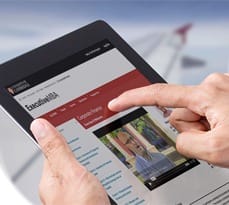
The Executive MBA furnishes senior executives with the knowledge and skills to excel in their organisations. Now, thanks to a unique new Virtual Learning Environment (VLE), the programme is delivered via an online hub that ties together classroom and independent study – and allows participants and faculty to interact and collaborate freely, irrespective of location.
Simon Learmount, director of the MBA and EMBA programmes, says:
“We spent the summer re-imagining the role of our VLE, and we’re very pleased with what has been produced. It’s allowed us to achieve what we originally set out to do with the EMBA – to make possible experiential, constructivist learning that’s tailored to the needs of our participants.”
The decision to rebuild the online platform was driven by the particular demands of a programme that attracts senior managers from all over the world. Learmount says:
On an EMBA, you have students who are very experienced – they have great ideas, insights and knowledge. You don't want to teach them as you'd teach undergraduates.
“Rather, you want to facilitate their learning. You need to provide the structure and frameworks that enable them to understand their experiences and share them meaningfully. The technology has evolved to allow these issues to be addressed in a new way. We now have a system that obliges the participants to interact with one another to an extent that they couldn’t before.”
An embedded learning tool
Many universities have embraced online programmes in recent years, and much coverage has been devoted to MOOCs (massive open online courses) and SPOCs (small private online courses). At Cambridge Judge, however, a “one size fits all” online platform is simply not appropriate for teaching small cohorts of highly qualified and motivated senior executives.
The EMBA’s Educational Technology Specialist, Mark Andrews, who oversaw the creation of the new system, says: “VLEs and learning technologies are often placed in a ‘silo’ at the edge of a programme where notes are stored and accessed. On the Cambridge EMBA it’s an embedded learning tool where participants are engaging with their study and discussing it with peers and faculty.”
Enabling experiential learning
“The online platform works across all the participants’ environments. It’s a hub that they typically have to go on to three or four times a week, though many go on twice a day to touch base and connect with the programme. They can do this wherever they are – at work, at home, on the train or even when they’re at Cambridge. Then they can apply what they’re learning to the context, in an experiential manner, and feed back to the EMBA.”
“We now have a programme that’s totally accessible to working professionals. To achieve this we worked closely with our internal IT team and external developers. They’re not just there to maintain and troubleshoot our technology, but increasingly they are engaged with the development process”.
Simon Learmount cites an example of the way the latest cohort is taking advantage of the system, and how it helps members to tailor the classroom sessions to their own needs. “One thing we ask our participants to think about in their Management Practice class is gender and management: issues around the role of women in organisations. We provide some interesting reading and have a debate in class, which always provokes strong reactions. You get some interesting insights from many different cultures.
“However, this year the debate has then rolled on to the VLE, and it has been populated with facts and evidence that people have found and posted online, such as news stories and videos from around the world. Participants have been able to share experiences from their own organisations, subject to the need to keep confidentiality.
“You end up with this stimulating, exciting range of material that goes way beyond people’s individual opinions of gender. Participants then say, let’s continue the debate the next time we’re back in Cambridge, when we can unpick this stuff face to face.
“This suddenly means that learning is qualitatively different. It’s more practice and experience based, and it includes the creation of new knowledge – not just ideas based on papers that academics have written, but new material that the participants have created.
Ongoing development
In all, it represents a major development of the EMBA offering. Mark Andrews says:
It keeps the conversation going. Some people view EMBAs as part-time courses, but they're not at all. You want to keep the flow of learning throughout the whole 20 months of the programme, not just the stop-start of the weekends the students spend at Cambridge.
“The online platform coupled with its embedded use within the programme provides the continuity to do this. What’s more, its development is an ongoing process that will continue to improve the delivery of the EMBA, realising our vision for the programme to an ever-greater degree.”


